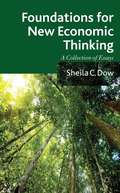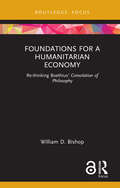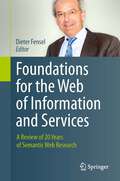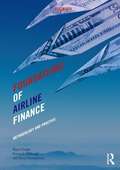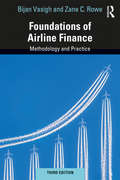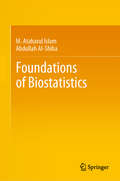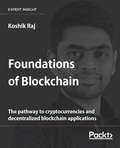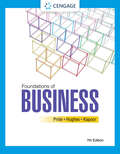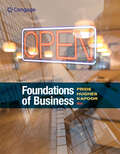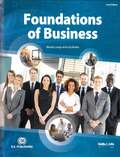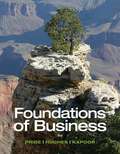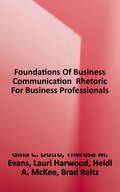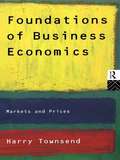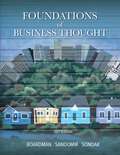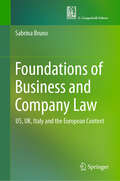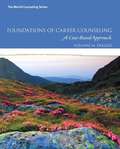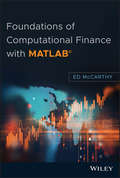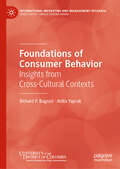- Table View
- List View
Foundations for New Economic Thinking
by Sheila C. DowNew economic thinking is in demand in the light of the recent economic crisis. This book equips the reader with a better understanding of current ways of thinking as well as an awareness of other possibilities, providing the foundations for debate in theory and methodology alongside practical implications for policy.
Foundations for Paramedic Education (SpringerBriefs in Education)
by Amy E. Seymour-WalshThis book addresses the nature of professional learning, paramedic skill development, practice assessment, and feedback from both clinical and educational theory perspectives. It provides clear guidance from the literature, learning theory, and current research to help clinical educators plan robust professional education activities that address students’ learning needs and clinical practice expectations. Based on the premise that assessment of practical skills and applied knowledge is integral to paramedic education, the book presents a worked example of a validated assessment approach. Each chapter contains realistic case studies for the array of paramedic education contexts, including simulated supervision, continuing in-service education, tertiary education and formal graduate programs. All chapters include a series of questions designed to guide both individual and group-based reflection on educational practice and philosophy.
Foundations for a Humanitarian Economy: Re-thinking Boethius’ Consolation of Philosophy (Economics and Humanities)
by William D. BishopThe modern global economy and discipline of economics place mathematical calculation above human concern. However, a re-reading of Boethius’ The Consolation of Philosophy can positively highlight the contrast in values and spirit of the early medieval European world with our own scientific age. This book discusses the historical and cultural contexts that influenced Boethius’ writing and explores how Consolation offers a radically different understanding of economic concepts: wealth from inner happiness and virtues, poverty from hoarding outer possessions, self-sufficiency in the greater whole, enlightenment through misfortune, and development as fruition from the Good. These economic considerations resonate with a range of heterodox economic perspectives, such as Ecological and Buddhist Economics. The fundamental revaluations gained through Boethius pose a critique of mainstream neoclassical and neoliberal economics: to consumerism, avarice, growth and technology fetishism, and market rationality. These economic foundations resonate into a time when global crises raise the question of fundamental human priorities, offering alternatives to an ever-expanding industrial market economy designed for profit, and helping to avoid irrevocable socio-ecological disasters. The issues raised and questioned in this book will be of significant interest to readers with concern for pluralist approaches to economics, philosophy, classics, ancient history and theology.
Foundations for a Humanitarian Economy: Re-thinking Boethius’ Consolation of Philosophy (ISSN)
by William D. BishopThe modern global economy and discipline of economics place mathematical calculation above human concern. However, a re-reading of Boethius’ The Consolation of Philosophy can positively highlight the contrast in values and spirit of the early medieval European world with our own scientific age.This book discusses the historical and cultural contexts that influenced Boethius’ writing and explores how Consolation offers a radically different understanding of economic concepts: wealth from inner happiness and virtues, poverty from hoarding outer possessions, self-sufficiency in the greater whole, enlightenment through misfortune, and development as fruition from the Good. These economic considerations resonate with a range of heterodox economic perspectives, such as Ecological and Buddhist Economics. The fundamental revaluations gained through Boethius pose a critique of mainstream neoclassical and neoliberal economics: to consumerism, avarice, growth and technology fetishism, and market rationality. These economic foundations resonate into a time when global crises raise the question of fundamental human priorities, offering alternatives to an ever-expanding industrial market economy designed for profit, and helping to avoid irrevocable socio-ecological disasters. The issues raised and questioned in this book will be of significant interest to readers with concern for pluralist approaches to economics, philosophy, classics, ancient history and theology.
Foundations for the Web of Information and Services: A Review of 20 Years of Semantic Web Research
by Dieter FenselIn the mid 1990s, Tim Berners-Lee had the idea of developing the World Wide Web into a "Semantic Web", a web of information that could be interpreted by machines in order to allow the automatic exploitation of data, which until then had to be done by humans manually. One of the first people to research topics related to the Semantic Web was Professor Rudi Studer. From the beginning, Rudi drove projects like ONTOBROKER and On-to-Knowledge, which later resulted in W3C standards such as RDF and OWL. By the late 1990s, Rudi had established a research group at the University of Karlsruhe, which later became the nucleus and breeding ground for Semantic Web research, and many of today's well-known research groups were either founded by his disciples or benefited from close cooperation with this think tank. In this book, published in celebration of Rudi's 60th birthday, many of his colleagues look back on the main research results achieved during the last 20 years. Under the editorship of Dieter Fensel, once one of Rudi's early PhD students, an impressive list of contributors and contributions has been collected, covering areas like Knowledge Management, Ontology Engineering, Service Management, and Semantic Search. Overall, this book provides an excellent overview of the state of the art in Semantic Web research, by combining historical roots with the latest results, which may finally make the dream of a "Web of knowledge, software and services" come true.
Foundations in Personal Finance (High School Edition)
by Dave RamseyThis book presents Introduction to Personal Finance and goes in detail about Saving,Budgeting ,Debt,Investing and Retirement and Insurance.
Foundations of Airline Finance: Methodology and Practice
by Bijan Vasigh Kenneth Fleming Barry HumphreysIn recent years the airline industry has experienced severe volatility in earnings, with airlines recording periods of substantial profits that are closely followed by periods of financial distress. This trend has continued into the new millennium, with numerous examples of airlines across the globe entering bankruptcy protection or liquidating. The text provides an introduction to both the basics of finance and the particular intricacies of airline finance where there can be significant fluctuations in both revenues and costs. This new edition also includes: capital budgeting management of current assets financial risk analysis fuel hedging aircraft leasing This textbook contains chapters that cover unique aspects of the aviation financial decision-making process. These include a rigorous and structured presentation of the buy versus lease decision that is prevalent in the industry, a valuation process for aviation assets, the recent trend toward privatization and the difficulty inherent in the valuation of a publicly-owned or semi-publicly owned asset. The Foundations of Airline Finance, now in its second edition, is an introductory text that can be used either as a general financial text or in a specialized class that deals with aviation finance in particular.
Foundations of Airline Finance: Methodology and Practice
by Bijan Vasigh Zane C. RoweThere are few industries that have had a more profound impact on business and society over the last century than aviation. This book is an accessible, up-to-date introduction to the current state of the aviation industry which provides readers with the tools necessary to understand the volatile and often complicated nature of airline finance. Understanding finance is critical in any industry; however, the financial track record of the airline industry places even more importance on effective financial management. Foundations of Airline Finance provides an introduction to the basics of finance – including time value of money, the valuation of assets, and revenue management – and the particular intricacies of airline finance where there can be wild fluctuations in both revenues and costs. The third edition of this text has been extensively updated to reflect the many changes in the air transport industry that have taken place since the publication of the second edition, and features an expanded chapter on aircraft leasing and many new international case examples. This thorough introduction to aviation finance is valuable reading as a general, introductory financial text, or as reading in specialized airline finance classes.
Foundations of Artificial Intelligence and Robotics: Volume 1 A Holistic View
by Wendell H. ChunArtificial intelligence (AI) is a complicated science that combines philosophy, cognitive psychology, neuroscience, mathematics and logic (logicism), economics, computer science, computability, and software. Meanwhile, robotics is an engineering field that compliments AI. There can be situations where AI can function without a robot (e.g., Turing Test) and robotics without AI (e.g., teleoperation), but in many cases, each technology requires each other to exhibit a complete system: having "smart" robots and AI being able to control its interactions (i.e., effectors) with its environment. This book provides a complete history of computing, AI, and robotics from its early development to state‑of‑the‑art technology, providing a roadmap of these complicated and constantly evolving subjects.Divided into two volumes covering the progress of symbolic logic and the explosion in learning/deep learning in natural language and perception, this first volume investigates the coming together of AI (the mind) and robotics (the body), and discusses the state of AI today.Key Features: Provides a complete overview of the topic of AI, starting with philosophy, psychology, neuroscience, and logicism, and extending to the action of the robots and AI needed for a futuristic society Provides a holistic view of AI, and touches on all the misconceptions and tangents to the technologies through taking a systematic approach Provides a glossary of terms, list of notable people, and extensive references Provides the interconnections and history of the progress of technology for over 100 years as both the hardware (Moore’s Law, GPUs) and software, i.e., generative AI, have advanced Intended as a complete reference, this book is useful to undergraduate and postgraduate students of computing, as well as the general reader. It can also be used as a textbook by course convenors. If you only had one book on AI and robotics, this set would be the first reference to acquire and learn about the theory and practice.
Foundations of Biostatistics
by M. Ataharul Islam Abdullah Al-ShihaThis book offers a comprehensive guide to essential techniques and methods in biostatistics, addressing the underlying concepts to aid in comprehension. The use of biostatistics techniques has increased manifold in the recent past, due to their suitability for applications in a wide range of problems in various fields. This book helps learners grasp the materials in detail, equipping them to use biostatistics techniques independently and confidently. The book starts with a summary of background materials, followed by methods and techniques. As such, with only minimum guidance from teachers, this book can provide materials for self-learning of biostatistics techniques with a deeper level of understanding. The first two chapters focus on fundamental concepts, sources of data, data types, organization of data, and descriptive statistics, followed by the basic probability concepts, distributions and sampling distributions needed in order to combine descriptive statistics with inferential techniques. Estimation and tests of hypotheses are illustrated in two separate chapters. Important measures of association, linear regression, analysis of variance and logistic regression, and proportional hazards models are then presented systematically, ensuring that the book covers the topics most essential to students and users of biostatistics in connection with a wide range of applications in various fields. The book has been carefully structured, and the content is presented in a sequence covering the essential background in a highly systematic manner, supporting the learning process by presenting theory and applications that complement one another.
Foundations of Blockchain: The pathway to cryptocurrencies and decentralized blockchain applications
by Koshik RajReaders should be comfortable with general security terms, but no knowledge of cryptography or decentralized application is assumed. Although the book begins with all the basic concepts, a hands-on python programming, and theoretical networking knowledge, would speed up the reading process.
Foundations of Business
by Jack R. Kapoor Robert J. Hughes William M. PrideAuthors Pride/Hughes/Kapoor believe that success is measured not only by the grade you receive in this course, but also by how the information in this book helps you build a foundation for a better life. That’s what FOUNDATIONS OF BUSINESS, 7E is all about. Updates highlight the specific challenges facing businesses and individuals, particularly following the global pandemic. The latest content, real examples and powerful new cases show you how to become a better employee, more informed consumer and successful business owner. You examine issues within the economy, business ownership, management, human resources, marketing, social media, e-commerce, management information systems, accounting and finance. You also learn how cultural diversity, ethics and social responsibility, small business and entrepreneurship and environmental concerns impact both the nation’s economy and you, as an individual consumer. MindTap and Infuse digital resources are also available.
Foundations of Business
by Jack R. Kapoor Robert J. Hughes William M. PrideRecognized for its concise, easy-to-understand approach, Pride/Hughes/Kapoor's FOUNDATIONS OF BUSINESS, 6E helps students build the solid foundation they need to succeed in today's competitive business world and in their personal lives. Up-to-date coverage presents forms of business ownership, management and organization, human resources management, marketing, social media and e-business, information systems, accounting, and finance. Students study how a nation's economy affects both individuals and business, ethics and social responsibility, small business and entrepreneurship, and the global environment. In addition, new cutting-edge topics examine the impact of social media on business, international business, green and socially responsible business and sustainability. MindTap online personalized learning experience now offers more activities and decision-making exercises.
Foundations of Business
by Mandy LangeAs part of the Skills for Life CTE Series, Foundations of Business prepares students for the global business environment by exploring themes of economics, leadership, marketing, financial management, and employment. Students use what they learn in each of these units to create a comprehensive business plan portfolio demonstrating a practical business idea. Business management, administration, finance, and marketing careers are spotlighted throughout the book to introduce students to real-world employment opportunities. Students also learn how to plan for a career and develop employability skills critical to domestic and international business. In addition, chapter exercises provide key terms and assessments to help students become successful in any business environment.
Foundations of Business (Fourth Edition)
by Robert Hughes Jack Kapoor William PrideFOUNDATIONS OF BUSINESS, 4E gives readers the comprehensive preparation they'll need to succeed in today's competitive business world. By providing a brief survey of business, including management and organization, marketing, social media and e-business, information systems, accounting, and finance, this text introduces the reader to core business practices. In addition, the authors address other important concepts such as ethics and social responsibility, forms of ownership, small business concerns and entrepreneurship, and international business. This edition is filled with cutting-edge content, including up-to-date information on the economic crisis, social networking, competition in the global marketplace, and the green movement, as well as suggestions on how to manage a business in the midst of economic ups and downs. An abundance of study aids also is available within the text and on the student companion website to help you achieve success in the course and in today's competitive business world.
Foundations of Business Communication: Rhetoric for Business Professionals
by Lauri Harwood Heidi A. McKee Gina C. Dutro Theresa M. Evans Brad ReitzFoundations of Business Communication: Rhetoric for Business Professionals, was written by the faculty of BUS 102 to provide a resource to help you in BUS 102, in your other FSB courses, and in your professional career. - Chapter 2: Business Communication Today explains the importance of effective communication in today's globally networked workplace and defines the characteristics of effective business communication. - Chapter 3: Rhetoric in Business Communication introduces the key concepts and strategies of rhetoric, the art and practice of effective communication. You will learn how to analyze the rhetorical situation of business communication so that you can craft effective messages appropriate for your purpose, audience, and context. - Chapter 4: Delivering Oral Communications examines the rhetoric of oral delivery, strategies for organizing oral communications, and design tips for presentation visuals. The primary focus is on extemporaneous presentations, but oral communications in other business contexts are also considered. - Chapter 5: Developing Business Relationships explains how to introduce yourself within business communities and how to frame requests that establish goodwill with your audience(s). This chapter also has tips for writing business emails. - Chapter 6: Business Communication Processes provides guidelines for the composing process for a variety of oral and written communications. - Chapter 7: Planning for the Job Search offers an overview of the job search communication process, from locating position announcements and networking to interviewing and job acceptance communications. - Chapter 8: Writing Cover Letters has information and advice on how to write a cover letter that will stand out to prospective employers. The assignment scenario focuses on opportunities available to early career college students, and from this project many students have found excellent summer internships and jobs. - Chapter 9: Collaborating and Communicating as a Team builds from the work on collaboration begun in BUS 101 and delves into the specifics of how to research, write, and present as a team. - Chapter 10: Reporting Your Findings examines the structure of formal recommendation reports and provides foundational strategies for how to narrate and represent qualitative and quantitative data. - Chapter 11: Making Recommendations explains how to deliver credible recommendations in writing and orally that are clear, concise, and thorough. - Chapter 12: Looking Back, Moving Forward covers the importance of reflective analysis for transferring learning from your first-year experiences into FSB's upper division core and major courses and on into your professional careers.
Foundations of Business Economics: Markets and Prices
by Harry TownsendFoundatioins of Business Economics explains microeconomic analysis in terms of real business situations. The underlying theme of the book is the way in which markets link together interdependent activities and how they confront and solve problems of information. The book covers a wide range of issues, including *The economic way of thinking *The Business environment *Product markets *Market failure *Factor markets *General equilibrium Theory is developed carefully but with a light touch and mathematics kept to a minimum, making the book easily accessible. It will be particularly valuable for those students whose interests lie on the human side of industry. explanation of microeconomic analysis in terms of real business practice. The author examines the way markets link together interdependent economic activities and provides general equilibrium models of the entire economic system.
Foundations of Business Law and the Legal Environment
by Jethro K. Lieberman Don Mayer Daniel M. Warner George J. SiedelMayer, Warner, Siedel and Lieberman's Foundations of Business Law and the Legal Environment is an up-to-date textbook with comprehensive coverage of legal and regulatory issues for your introductory Legal Environment or Business Law course. The text is organized to permit instructors to tailor the materials to their particular approach. The authors take special care to engage students by relating law to everyday events with which they are already familiar with their clear, concise and readable style. Business Law and the Legal Environment provides students with context and essential concepts across a broad range of legal issues with which managers and business executives must grapple. The text provides the vocabulary and legal savvy necessary for business people to talk in an educated way to their customers, employees, suppliers, government officials -- and to their own lawyers. With Foundations of Business Law and the Legal Environment, the authors have created a text that not only has both case summaries and excerpted cases, but one that you can easily customize by deleting chapters, reordering the content, adding your own material, and even editing at the line level with Flat World's easy-to-use MIYO (Make It Your Own) Platform.
Foundations of Business Thought
by Calvin Boardman Alan Sandomir Harris SondakNow published by Sage Foundations of Business Thought, Ninth Edition presents the writings of great contemporary and historical thinkers in an effort to develop the conceptual foundation for commercial activity in general and the ideals of accounting, finance, management, marketing, and operations/production in particular. This unique approach of using classical works of authorship reinforces the importance of clear, critical, and integrative thinking. Since 1993, many thousands of students across the United States have been introduced to the world of commerce and business through a process that makes business concepts at once understandable and intimately personal. Business is presented as a series of human connections designed to address the personal needs and wants of individuals based on sets of values and codes of ethics that guide our thoughts and actions in a market setting. Business techniques and tools may change over time but the essential goals and concepts of commercial activity remain unchanged across both geography and time. Inspired by a four volume set of books produced by the Harvard Business School in 1962, entitled The World of Business, this course and the book upon which it rests present the writings of great contemporary and historical thinkers in order to develop the conceptual foundation for commercial activity in general and the ideals of accounting, finance, management, marketing and operations/production in particular. This unique approach of using classical works of authorship reinforces the importance of clear, critical and integrative thinking. These works first outline the motivations for the development of commercial activity and, then, present the fundamental elements important to the foundation of a commercial society. These foundational concepts are followed by sections devoted to the various functional areas of business, again introduced by classical works that have both passed the test of time and provide unique insights into each of the areas. Faculty are provided with detailed instructions on methods of relating the material to contemporary business concepts and practice. While this roadmap provides structure for the material, faculty are encouraged to take advantage of their individual specialization and creativity. This could end up being one of the most enjoyable courses a faculty member will teach. Students are encouraged to be critical of the readings, of the concepts and, most particularly, their own notions about business and, at the same time, open to new ideas, the thoughts of others and the opportunities for personal growth. Through careful reading of the text, participating in classroom discussions, expanding knowledge through individual research and by writing position papers on contemporary business topics, this course has the potential to be one of the most impactful undergraduate or graduate courses students will take in their college career.
Foundations of Business Thought
by Calvin Boardman Alan Sandomir Harris SondakNow published by Sage Foundations of Business Thought, Ninth Edition presents the writings of great contemporary and historical thinkers in an effort to develop the conceptual foundation for commercial activity in general and the ideals of accounting, finance, management, marketing, and operations/production in particular. This unique approach of using classical works of authorship reinforces the importance of clear, critical, and integrative thinking. Since 1993, many thousands of students across the United States have been introduced to the world of commerce and business through a process that makes business concepts at once understandable and intimately personal. Business is presented as a series of human connections designed to address the personal needs and wants of individuals based on sets of values and codes of ethics that guide our thoughts and actions in a market setting. Business techniques and tools may change over time but the essential goals and concepts of commercial activity remain unchanged across both geography and time. Inspired by a four volume set of books produced by the Harvard Business School in 1962, entitled The World of Business, this course and the book upon which it rests present the writings of great contemporary and historical thinkers in order to develop the conceptual foundation for commercial activity in general and the ideals of accounting, finance, management, marketing and operations/production in particular. This unique approach of using classical works of authorship reinforces the importance of clear, critical and integrative thinking. These works first outline the motivations for the development of commercial activity and, then, present the fundamental elements important to the foundation of a commercial society. These foundational concepts are followed by sections devoted to the various functional areas of business, again introduced by classical works that have both passed the test of time and provide unique insights into each of the areas. Faculty are provided with detailed instructions on methods of relating the material to contemporary business concepts and practice. While this roadmap provides structure for the material, faculty are encouraged to take advantage of their individual specialization and creativity. This could end up being one of the most enjoyable courses a faculty member will teach. Students are encouraged to be critical of the readings, of the concepts and, most particularly, their own notions about business and, at the same time, open to new ideas, the thoughts of others and the opportunities for personal growth. Through careful reading of the text, participating in classroom discussions, expanding knowledge through individual research and by writing position papers on contemporary business topics, this course has the potential to be one of the most impactful undergraduate or graduate courses students will take in their college career.
Foundations of Business and Company Law: US, UK, Italy and the European Context
by Sabrina BrunoThis textbook focuses on the interrelationships between economic elements and legal principles with regard to business and company law. Three jurisdictions are taken into consideration: US, UK, and Italian law (the last of which was chosen as a “prototype” of continental European legal systems). The economic elements underlying business and company law are actually common to the three legal systems and, consequently, their legal principles and rules are similar despite one jurisdiction (namely, Italy) being based on civil law and the other two on common law. Their similarities are also due to the historical origins of the legal instruments that are covered by the book: partnership law dates back to the Romans, while company law can be traced back to English law. Roman law and English law have influenced, respectively, partnership law and company law around the globe. The book addresses the following topics: proprietorship law, partnership law and company law. For each topic, it first identifies the economic and legal elements that are shared by the three jurisdictions, then explores each one separately to highlight the differences. The textbook is based on over thirty years of research on business and company law conducted by the author in Italy, the UK and US and more than fifteen years of teaching this subject to international students at Luiss G. Carli University of Rome as part of its Bachelor of Economics and Business program.
Foundations of Career Counseling: A Case-Based Approach (First Edition)
by Suzanne M. DuggerThis text is designed for professors and counselor-educators interested in finding ways to excite graduate students about the theory and practice of career counseling. <P><P>This text uses a case-based approach to engage students in the study of what can sometimes be rather dry content.
Foundations of Computational Finance with MATLAB
by Ed McCarthyGraduate from Excel to MATLAB® to keep up with the evolution of finance data Foundations of Computational Finance with MATLAB® is an introductory text for both finance professionals looking to branch out from the spreadsheet, and for programmers who wish to learn more about finance. As financial data grows in volume and complexity, its very nature has changed to the extent that traditional financial calculators and spreadsheet programs are simply no longer enough. Today’s analysts need more powerful data solutions with more customization and visualization capabilities, and MATLAB provides all of this and more in an easy-to-learn skillset. This book walks you through the basics, and then shows you how to stretch your new skills to create customized solutions. Part I demonstrates MATLAB’s capabilities as they apply to traditional finance concepts, and PART II shows you how to create interactive and reusable code, link with external data sources, communicate graphically, and more. Master MATLAB’s basic operations including matrices, arrays, and flexible data structures Learn how to build your own customized solutions when the built-ins just won’t do Learn how to handle financial data and industry-specific variables including risk and uncertainty Adopt more accurate modeling practices for portfolios, options, time series, and more MATLAB is an integrated development environment that includes everything you need in one well-designed user interface. Available Toolboxes provide tested algorithms that save you hours of code, and the skills you learn using MATLAB make it easier to learn additional languages if you choose to do so. Financial firms are catching up to universities in MATLAB usage, so this is skill set that will follow you throughout your career. When you’re ready to step into the new age of finance, Foundations of Computational Finance with MATLAB provides the expert instruction you need to get started quickly.
Foundations of Consumer Behavior: Insights from Cross-Cultural Contexts (International Marketing and Management Research)
by Richard P. Bagozzi Attila YaprakThis book delves into the intricate aspects of consumer behavior, exploring constructs such as attitudes, values, and identity through comprehensive literature reviews. It extends this exploration to encompass cross-cultural consumer behavior constructs, including ethnocentrism, cosmopolitanism, affinity, and animosity. The authors argue that consumer behavior often attempts to derive and apply basic knowledge that applies in various senses to all or nearly all cultures, but at the same time must be qualified by introducing specific aspects of cultures to improve the fit and predictions of general theory. This means introducing in existing theories moderating variables and processes that condition the explanations and forecasts that theory makes with cultural knowledge as needed, as well as at times attempting to derive theories that infuse cultural within the basic psychological and social processes that constitute consumer behavior.Moreover, the text investigates howconsumers learn about and adopt new technologies as well as the role of social media and AI in consumer behavior. Bridging consumer behavior and management topics with strategic insights, this work will be of great interest to students and scholars alike who are interested in the role of culture in consumer behavior.
